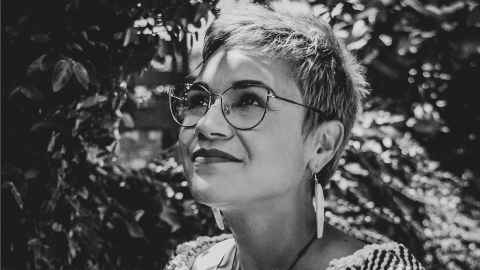Dr Emma Espiner
Dr Emma Espiner is a doctor, podcaster and author motivated to draw attention to the inequity of the health system.

Dr Emma Espiner’s way of relaxing is to be active.
And that is the only way to explain how at age 30, while pregnant, she could contemplate trading a six-figure salary in the commercial world for years of medical studies.
“I was working in executive recruitment … a lot of fun, but it wasn’t soul food for me. I didn't really feel as if I was helping anyone who needed to be helped,” Emma (Ngāti Tukorehe, Ngāti Porou) told RNZ’s Kim Hill.
That radio interview was ahead of Emma’s appearance at the Auckland Writers Festival in May 2023 and the launch of her memoir There’s a Cure for This.
As she writes in the book: “We had just bought a house in Auckland, we were about to have a baby and I was suggesting I spend six years not earning anything at all for a career gamble that showed absolutely zero chance of paying off.”
It turns out Emma was underselling her scheme. Having finished medical school, she says: “It was wonderful to graduate as a doctor but I knew that it was just the beginning of the next challenge.”
If her life was busy before, it’s arguably more frenetic now that she is a surgical registrar at Middlemore Hospital, a podcaster, an author and the mother of a nine-year-old girl.
The other new ingredient in the mix, and perhaps the key to her being able to take on more projects, is the motivation to help remedy the inequity in healthcare she witnesses as a doctor. The book and podcast – Voyager 2021 best narrative podcast winner Getting Better – shine a light on that issue.
She has also won another Voyager award, for best opinion writer in 2020, and has been published in media both in New Zealand and abroad as well as in academic and literary journals.
Describing it as “mixed-up logic”, Emma says she developed a writing sideline as an antidote to medicine.
“It needed to be something really demanding because the job and study are so all-consuming that it’s easy for that to completely become your life.”
From the moment she applied to the University of Auckland for entry to medical school, it’s been a high-wire act.
“There were so many scary ‘is this going to happen or is it not?’ moments. And they don’t stop, which is the most devastating thing about it.
“Because you get into the job and then you decide to specialise and then there are all these other ways to fail.”
With her heart set on general surgery, she faces another seven years of on-the-job learning and exams if she’s accepted for training.
Emma feels like she’s with family in the operating theatre. The nature of the job means work-life balance is a forlorn hope, so “you have to have a kind of family around you when you’re there because it’s so intense and stressful and the hours are so long”.
She acknowledges her mother and grandmothers as key influences on her and Middlemore Hospital’s “entire surgical department and most other clinicians, nursing staff and healthcare assistants, ward clerks and cleaners for showing me what it means to be a doctor”.
She’s also grateful for the “exposure to excellence in clinical education and research with Māori in positions of leadership and influence” that she was exposed to at med school, which has set her up for the challenges of the job.
And the biggest challenge of all?
“How to be a doctor in a resource-challenged health system that has been slow to act on inequity despite mountains of evidence.”
Of her personal aspirations, she says: “Stay optimistic and well while remaining in this profession. Write more books. Rest more. Sleep occasionally.”